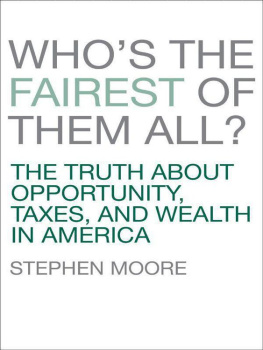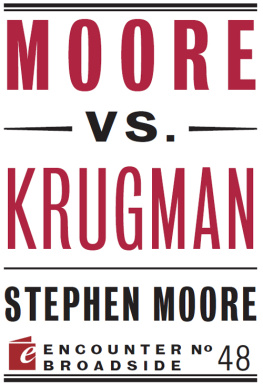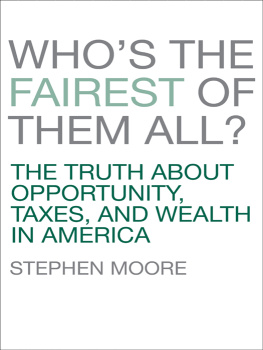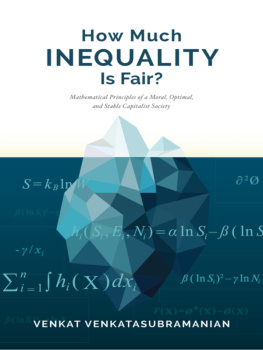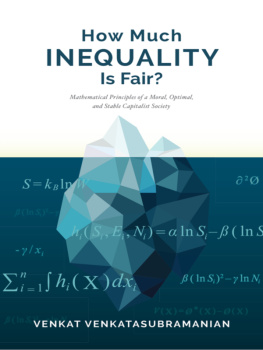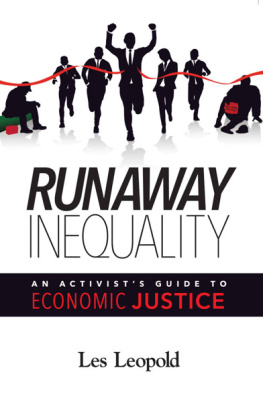
C ONTENTS


F OREWORD

N ot since the 1930s has the issue of class warfare been more front and center in the policy debate in Washington. President Obama is seeking higher tax rates on capital gains, dividends, estates, small business owners, and "the rich. He is not promoting these ideas to enhance economic growththey are anti-growth policiesbut to advance the concept of fairness. If economic growth isnt the goal, we shouldnt be surprised if this agenda doesnt generate it. But it is worse than thatunless it is reversed, this agenda will set in motion the largest tax hike in decades beginning on January 1, 2013. I know of no economic theory that would predict this policy will make America more prosperous.
The current fairness rhetoric from the White House is an unfortunate misplacement of attention; the key policy task is to restore robust and resilient economic growthwhich will make all Americans better off. While industriousness, hard work, and grit have traditionally been virtues respected by all Americans, too many commentators diminish this virtue by dividing society into the "haves and the "have-nots, then assigning blame to this outcome on businesspeople. Worse, success, risk-taking, and entrepreneurshipvital for growth and job creationare vilified.
My own research, and research by many scholars, supports the major findings of this bookthat low tax rates, the free enterprise system, and steady economic growth are the best tools to improve Americans economic condition. High tax rates, especially on investment and saving, reduce growth, which means less economic opportunity for those who start at the lowest rungs of the economic ladder. We can avoid high tax rates with an emphasis on spending restraint and tax reform that would reduce marginal tax rates.
It is important to get the history right, too. Restraints on taxes and spending in the 1980s and 1990s did not shrink the ranks of middle-income Americans, as some argue today. Indeed, they helped to make middle-income individuals as a group better off and helped increase the income and wealth of many. This is called upward economic mobility. And this upward climb is not enhanced by attacking the well-off, but through greater competition and opportunity.
In the past several years, concerns about upward mobility have rightly been raised, in part thanks to a severe recession and the anemic recovery. The combination of failure to confront the nations long-term fiscal challenges and increased policy uncertainty have retarded private-sector growth. Even in 2011, as the economy was technically growing, median after-tax income fell. No wonder so many Americans believe we are still in recession.
The debate about higher taxes and income inequality and the role of government versus free enterprise in distributing income is likely to dominate the policy debate in the months and years ahead. To prepare voters for the important choices they must make that debate based on facts and evidence, not half-baked truths sprinkled with catchy lingo about "fairness, "equality, "greed, "the 1 percent versus the 99 percent, and "tax cuts for the rich.
Many of the stubborn facts about taxes, income growth, and wealth are contained in this book and many of them may surprise readers. That the rich dont pay their fair share is by now a Washington staple. That the richest 1 percent pays almost 40 percent of income taxesas reported by the IRSmay to many appear to be a closely guarded secret.
This book, then, and its array of economic statistics is a step toward informing the debate the nation must have. If Americans familiarize themselves with facts, they will be better-informed voters. And in that case, the odds are high that voters will choose policies that create a new rising tide of prosperity in America that lifts our prosperity and our childrens prosperity.
Glenn Hubbard, Columbia University

C HAPTER 1

T HE P OVERTY OF E QUALITY
The year was 2081, and everybody was finally equal. They werent only equal before God and the law. They were equal every which way. Nobody was smarter than anybody else. Nobody was better looking than anybody else. Nobody was stronger or quicker than anybody else. All this equality was due to the 211th, 212th and 213th Amendments to the Constitution, and to the unceasing vigilance of agents of the United States Handicapper General.
S o began Kurt Vonneguts 1961 short story "Harrison Bergeron.
But Harrison Bergeron was a special problem, because he was so far above average in everything. Vonnegut explained, "Nobody had ever borne heavier handicaps. Instead of a little ear radio for a mental handicap, he wore a tremendous pair of earphones, and spectacles with thick wavy lenses.
The youthful Harrison did not accept these burdens easily, so he had been jailed. But with his myriad advantages and talents, he had broken out. An announcement on TV explained the threat, "He is a genius and an athlete and should be regarded as extremely dangerous.
Harrison broke into a TV studio, which was broadcasting the performance of a troupe of dancing ballerinas. On national television, he illegally cast off each one of his handicaps. Then he did the same for one of the ballerinas, and then the orchestra, which he commanded to play. To shockingly beautiful chords, Harrison and the ballerina began to dance. Vonnegut explained the beauty of their dance,
Not only were the laws of the land abandoned, but the laws of gravity and the laws of motion as well. The studio ceiling was thirty feet high, but each leap brought the dancers nearer to it. It became their obvious intention to kiss the ceiling. They kissed it. And then, neutralizing gravity with love and pure will, they remained suspended in air inches below the ceiling, and they kissed each other for a long, long time.
Social safety nets to provide a floor of help for the needy and to alleviate human suffering are easily justifiable on moral grounds. Nearly everyone supports them to prevent severe hardship for those disabled, or widowed, or orphaned, or even just temporarily down on their luck. In modern and wealthy societies like ours, there is broad voter consent to such policies that ensure that people do not suffer from deprivation of the necessities of life: food, shelter, and clothing. This recognizes that we have a moral obligation to help our fellow man. How much of that should be done with private charity and how much should be done with government taxation and distribution is always an open question. And the truth is, such safety nets designed to rely on modern markets and incentives, and focused on the truly needy, would not be costly, in proportion to the immense wealth of our society.

